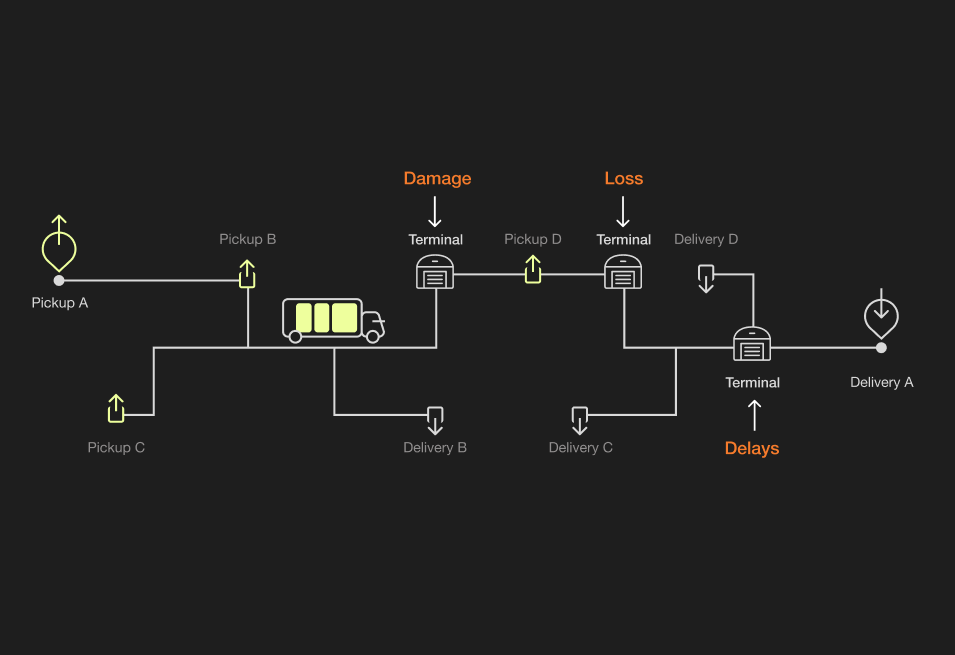Mitigating Your Freight Risk in Tumultuous Times

After absorbing one black swan event after another over the last several years, the logistics industry remains in precarious circumstances. Weeks ago, tense contract negotiations between UPS and the Teamsters appeared to collapse — paving the way for a historic strike that would have taken 340,000 drivers off the road and cost the economy an estimated $7.1 billion over 10 days. Companies prepared by shifting goods typically handled by UPS to alternate vendors, and even considered alternate modes in some cases. Fortunately, the parties reached an agreement. But it still seems like the threat of major disruption is becoming the new normal in logistics. In addition to labor disputes, shippers and carriers are facing tumultuous markets and more frequent climate-driven disruptions. The bankruptcy of Yellow, one of the nation’s largest carriers, has shippers worried about lost cargo, capacity constraints, and higher prices. Meanwhile, severe weather events are intensifying across the country, shutting down more roads and freight corridors for longer periods. All of these factors add up to a less reliable freight market. Thankfully, a mode of moving goods called shared truckload (STL) increasingly offers shippers the flexibility they need to withstand disruptions and save money — all while cutting their carbon emissions.
The two primary ways that most goods move on trucks today — truckload (TL) and less-than-truckload (LTL) — are by themselves poorly suited to this era of instability. LTL’s model of passing goods through multiple consolidation terminals makes it more vulnerable to disruptions of all kinds. Like air travel, indirect LTL routes create risks that direct routes don’t have. Every traveler knows that layovers heighten the likelihood of delay from bad weather, faulty equipment, and staffing issues at each stop — not to mention the potential for lost baggage. Similarly, every hub, spoke, and consolidation point along an LTL route compounds the risk of damage, delay, and loss. With extreme weather, all of those points where freight idled in transit become liabilities. Earlier this summer, wildfire smoke shut down the Port of New York and New Jersey, trapping goods in the busiest container port on the East Coast. LTL networks, with their frequent stops and indirect routes, will become even more vulnerable to these types of extreme weather events across the country.Shipping TL instead might help shippers avoid those pitfalls, but at the cost of paying to ship air if their goods don’t require the truck’s full capacity. A recent study conducted by our team and Drive Research found that 45 percent of shippers that reserved an entire truck were unable to fill them to even half-capacity. Paying for empty space is bad for their bottom lines — and for reducing the carbon emissions that contribute to extreme weather in the first place. Shared truckload offers all the benefits of TL while avoiding the disruption-prone elements of LTL. STL pools freight so that shippers only pay for the space they need. Meanwhile, carriers fill their trucks and earn more from every linear foot of capacity. In 2022, our STL offering – FlockDirect® – saved businesses more than $56 million in shipping costs. Most importantly, STL provides increased resilience in the face of daily uncertainty such as localized storms and staffing disruptions at hubs. Shipments stay safe and in a single truck, driven by a single driver, and are kept moving all the way to their destination.

And now, machine learning models fed by increasingly massive data sets are making STL possible at an unprecedented scale. Our patented technology combines partial shipments into full trucks, substantially reducing cost and overall carbon emissions. By moving goods more efficiently and without degrading service quality, we estimate that FlockDirect® can slash emissions by up to 40 percent compared to alternative modes. Unfortunately, the current volatility in freight is not just a blip on the radar. Logistics professionals can expect that extreme weather, labor disruptions, and market volatility will continue to make traditional modes less reliable and more expensive to navigate. As the climate crisis intensifies, extreme weather conditions will cause stress and injury for drivers, as well as hazardous road conditions that impede their routes. By one estimate, the loss of labor from extreme heat will cost the U.S. economy $500 billion per year by 2050. And if it’s too hot for drivers or terminal staff to work, goods simply won’t move. Unions have already recognized the effect of climate on reliability; one of the biggest sticking points in the UPS-Teamsters negotiations was the lack of air conditioning in vans. With unionization interest growing, especially among the next generation of workers, the organized labor movement remains strong. Meanwhile, Yellow’s bankruptcy illustrates that even established carriers are not immune to rapid market shifts. But despite all the disruption, the demand for freight trucking isn’t slowing down. It’s time to get ahead of the curve by rethinking how we move goods on trucks. FlockDirect® is the carbon-cutting, hubless offering that will not only mitigate the cost of disruption but allows shippers to thrive in these tumultuous times.Book a personalized demo to see how our patented shared truckload technology can help your business.





